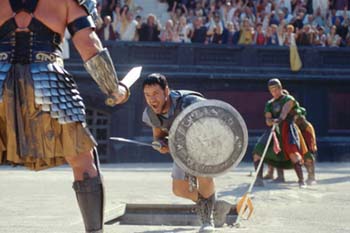![[Metroactive Movies]](/movies/gifs/movies468.gif)
[ Movies Index | Show Times | Santa Cruz | Metroactive Central | Archives ]
 We're So Glad: Russell Crowe fights for his life in 'Gladiator.' Arena Action Ridley Scott's epic-sized 'Gladiator' is long on action, short on wit By Richard von Busack AS BEFITS a dark historical subject, Gladiator has a somber, morbid tone. Director Ridley Scott overcomes silliness by taking the opposite tack of moroseness. The tale of a hero, his ordeal and his eventual triumph is treated with heaviness, not to mention the flattest dialogue of the year. Russell Crowe plays Maximus, the Roman general betrayed by Emperor Commodus (Joaquin Phoenix). Enslaved for the provincial arenas as a gladiator, he becomes a renowned fighter and is taken to Rome, where he has a chance to confront the emperor who ruined his life. At its best, the film provides not just the re-creation of ancient Rome but also a powerful triangle, making Commodus a sad figure as well as a mad one. The real Commodus was a beefy bully, said to have killed 100 tigers in an afternoon in the arena. Phoenix plays him as a spoiled, neurotic figure suddenly given the world. Part of that realm is his sister, Lucilla (Connie Nielsen), with whom he has a queasy incestuous romance. Lucilla was also once Maximus' lover. The tense confrontations between Lucilla and Commodus are as good as the unexpected sorrows of Rutger Hauer in Blade Runner. The arena scenes? They're lit with the bronze glow of the pagan city; the hot-afternoon colors look like the world of the photo-realist painters of the late 1800s who tried to imagine what Rome looked like. As always, the computer-generated effects are hit and miss. The night scenes look like a cheap misprinted poster, but the vivid day scenes offer a great barbaric spectacle. Gladiator is a remarkable spectacle of unforgivable length, marred by the endless hamming by the late Oliver Reed (in a caftan) as Maximus' mentor, Proximo. Richard Harris' Marcus Aurelius at first has a Don Corleone huskiness in his voice, but Harris ends by reviving his famous, mawkish turn as King Arthur at the fall of Camelot. Although it is visually sumptuous, Gladiator doesn't have a point of view. In essence, it's confused by what Rome means--and, by extension, what Western civilization means. Is Rome is just home, family and hearth, as Maximus believes it? Or is the heart of Rome just the mob--a mob to be led and swayed by the great? That is how a wary, cynical senator (Derek Jacobi) explains it to Maximus. Certainly, Scott treats the crowd of Rome as a horrible swarming rabble. The closest we get to them is a scene of Maximus pestered by the crowd as he walks, a scene of milling, shouting whores and beggars. These images are precisely as the satirist Juvenal described that city he hated. ("Where did the jaws of greed ever open wider?") This fatalism is valid enough, but it's not enough of a theme for an epic. Scott suggests that heroes will risk their deaths for people who won't even be worthy. The film has a swashbuckling motto: "Death smiles at us. All a man can do is smile back." No smiling allowed here. The film doesn't live up to that jest, which, no matter how simple-minded, movie fans have loved ever since the days of the death-defying Douglas Fairbanks Sr. Scott directs this bitter epic as the master of ceremonies at a Roman arena might, pessimistically wondering what will keep the crowd entertained, and dreading their appetites.
Gladiator (R; 150 min.), directed by Ridley Scott, written by David Franzoni, John Logan and William Nicholson, photographed by John Mathieson and starring Russell Crowe, Joaquin Phoenix and Connie Nielsen, opens Friday at selected theaters. [ San Jose | Metroactive Central | Archives ]
|
From the May 4-10, 2000 issue of Metro, Silicon Valley's Weekly Newspaper.
Copyright © 2000 Metro Publishing Inc. Metroactive is affiliated with the Boulevards Network.
For more information about the San Jose/Silicon Valley area, visit sanjose.com.